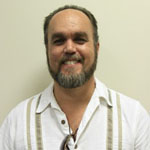I was sitting at a table with a fellow prisoner more than twenty years ago. We were taking a break from our work in the staff kitchen, smoking cigarettes and talking about some forgotten subject. The room we were in was one of the few places where I could relax, since it was a restricted area and usually quiet. One of his friends walked into the room, paused, and stared at us for a few seconds. He made a comment about talking to a white guy, a “cracker.” My coworker, who was black, just laughed and said, “We’re living the dream of Dr. King.”
were taking a break from our work in the staff kitchen, smoking cigarettes and talking about some forgotten subject. The room we were in was one of the few places where I could relax, since it was a restricted area and usually quiet. One of his friends walked into the room, paused, and stared at us for a few seconds. He made a comment about talking to a white guy, a “cracker.” My coworker, who was black, just laughed and said, “We’re living the dream of Dr. King.”
I had of course heard of Dr. King, but in that world his influence and ideas seemed pretty far away most of the time. My own path led me to study Gandhi, particularly his use of nonviolence as a way to oppose the domination of India by the British. Gandhi, who is said to have been set on his own course by reading the works of Thoreau, in turn had a deep influence on King.
All three men had in common a willingness to name injustice where they saw it, and to then do something about it. Most of us don’t even acknowledge injustice, especially if there is a potential for us to be harmed. Even fewer have the willingness to act. One of my favorite MLK quotes is, “The arc of the moral universe is long, but it bends toward justice.”
This quote originated in the works of Theodore Parker, an abolitionist, a Unitarian minister, and, like Thoreau, a transcendentalist. Here is his longer quote, published in a collection of surveys in the mid nineteenth century:
“Look at the facts of the world. You see a continual and progressive triumph of the right. I do not pretend to understand the moral universe, the arc is a long one, my eye reaches but little ways. I cannot calculate the curve and complete the figure by experience of sight; I can divine it by conscience. But from what I see I am sure it bends towards justice.”
The nation has set aside this Monday to celebrate King’s life and works, and his legacy. We are urged to go into our communities and work to make them better. Some work on beautification projects, others volunteer at homeless shelters. There is always good work that needs doing. Yet, I wonder who is doing the harder work that King took on, the work that led to his assassination over forty years ago?
Parker was born in 1810, and King died in 1968. No one has stepped forward to fill the gap left when King’s life was cut short. I do not mean that no one speaks up for justice; indeed I know many who have committed their lives to it. Where is that bold figure that speaks the truth though? Where is the leader who captures the moral imagination of a nation?
I still hold out hope of seeing King’s dream realized. He saw a world not only of racial equality, but of care and concern for all in need. He saw a world where injustice was dealt with, whatever forms it takes. Readers of this site will be familiar with the ongoing injustices of our day. The overrepresentation of minorities in the justice system, criminalization of misbehavior in schools, harsh sentences for kids that harm instead of heal, a lack of resources for real solutions…The list is long, and sometimes it seems fruitless to act, a wasted effort. Yet, like King and Parker, we can remember that while it may not be our fate to see the results of good action, it is our duty to move forward in the faith that justice will overcome injustice. Let this be our guide as we move into another year.































